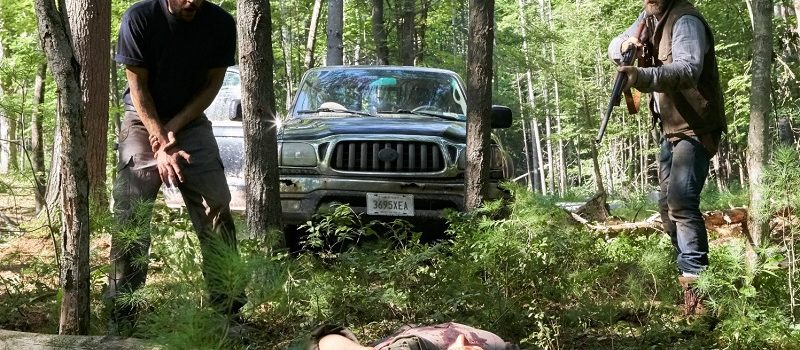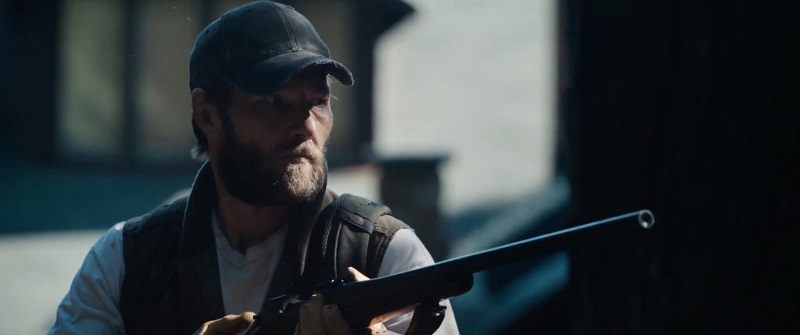There is a special kind of horror movie that gets inside your head. If it is worth its weight in psychological thrills, it will also stay bombastically bouncing around both your subconscious and conscious for days after. It Comes at Night is such an experience.
Written and directed by Trey Edward Shults, the film follows a family (Joel Edgerton’s Paul, Carmen Ejogo’s Sarah and their son Travis — played by Kelvin Harrison, Jr.). The world outside is a mystery, but from what can be gleaned, the state of humankind is not good. Paul runs his house like a military fort with a bolted door in the basement serving as the only way to get in or out. There are rules that layer on the fear factor for the viewer, such as never go out at night. That alone is enough to raise an eyebrow!
One night, a person (or is it?) is heard rummaging beyond that bolted basement door making all kinds of hair raising noises. The ruckus gets louder. It gets closer. Eventually, whatever is behind the painted-red door tries to break it down to get inside. Armed with a shotgun, Paul tears open the door and at the end of the barrel of his gun is a man, a desperate one at that. Thinking the house was abandoned, he was simply trying to get in to the home to secure supplies for his desperate for water young family. After much discussion, Paul and his family feel they can trust this new clan, especially because they can bring animals (i.e. food) to the property and collectively these two families just might be able to survive.
Paranoia, suspicion and other factors that would permeate a world slowly being voided of humans for mysterious reasons commence to divide our happy families. Blame, familial protectionism and old fashion animalistic tendencies begin to take over. Whatever is out there that is scaring our ensemble to their core, well, it begins to have a firm grasp on the imagination of the audience as well.
It Comes at Night is a slow burn. And by slow burn, we mean a snail’s pace — but in the best of ways. You are right with that slowly moving slug of a story, because as it progresses, the horror intensifies, the mystery magnifies and the human drama slowly sears in the most sensational of ways. Questions multiply and answers become few and far between. That, perhaps, is what is the film’s most terrific terrifying trait.
Edgerton again excels in a way that has him gradually laying the groundwork as one of his generation’s most gifted screen presences. After the subtle turn he delivered (that was an Oscar snub in our mind) in Loving, he has chosen wisely again. This time out, his character is commanding and sure, yet compassionate in the hope that the light of the human race has not gone dark. As our story progresses, through his eyes, it is a stark realization that unfortunately that may just be the case. Ejogo and Harrison fill out his family in the most satisfying of ways. We pull for this clan to be able to make it through each night and welcome the rising sun the following morning.
As is the case with most psychological cinematic sensory attacks, so much of the saluting has to go to the auteur behind it. Shults makes his feature-length debut with It Comes at Night and it is an announcement for high atop the horror hills. His sense of pacing is impeccable. His script and direction is gripping in every sense of the word.
The unknown is a powerful tool for a filmmaker. The key is knowing how to use it in a way that pulls your audience in, firmly holds their collective hearts in the story’s hands and then take it places that only further their fears and causes a physical manifestation of hyper-terror in their seats. You will squirm. Eyes will be shielded. Most of all, It Comes at Night will leave you stunned, breathless and downright desperate to do anything in our power to ensure that the world Shults has painted is not the one we are heading towards as past and present fade into the future.
Grade: A-



